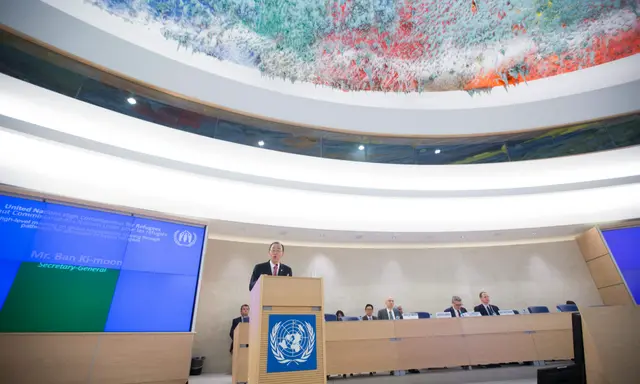Starting next Tuesday, all the current eight candidates will speak one by one at an open hearing of the UN General Assembly to shed light on why they are seeking to become the next UN secretary-general.
The move is history making for the United Nations, which just celebrated its 70th birthday last year.
The hearing, which will be informal, will be televised and webcast from UN Headquarters in New York. It will last for three days, with each of the eight candidates given a time slot of two hours, including a short oral presentation followed by answering questions from representatives of UN member states, now numbering 193.
The new move will be historic, but it will not change the nature and core of the process to select a new UN secretary-general.
There is no model for such dialogues within the United Nations, which means that there is no model for questions, either. Some member states may end up using this time to make political statements or might speak beyond their allotted times.
If time remains at the end of the two-hour period, the candidate will get questions from civil society. If all this does not suffice, each candidate can further press their case to the media at a stakeout set up outside the General Assembly Hall.
Mogens Lykketoft, the president of the UN General Assembly, said in an article published online late this week that he initiated the move to increase transparency and inclusiveness in the process of selecting the secretary-general in a bid to reform what he called "an archaic selection process" -- a relatively closed process by the UN Security Council.
"One might think ... that the process for choosing the secretary-general would be as vigorous, inclusive and transparent as possible," Lykketoft said in the article.
"But to date this has not been the case."
"As president of that Assembly, it is my job to ensure that those changes are implemented," he said.
The proposed game changing is aimed at finding the best leader for the United Nations, which is facing grave challenges, such as climate change, sustainable development and terrorism.
To a large extent, the open hearing is helpful for UN member states to have a better understanding of the visions of each of the eight candidates, including Igor Luksic, former prime minister of Montenegro, Irina Bokova, former foreign minister of Bulgaria and current chief of the UN Educational, Scientific and Cultural Organization, Danilo Turk, former president of Slovenia, Vesna Pusic, former foreign minister of Croatia, Natalia Gherman, former deputy prime minister of Moldova, Helen Clark, the former prime minister of New Zealand and head of the UN Development Programme, and Antonio Guterres, former prime minister of Portugal and former head of the UN refugee agency.
Three of the eight candidates are former presidents or prime ministers, and four are from countries that were once part of Yugoslavia, and two are current heads of UN agencies.Only Clark is from a non-European country.
At the United Nations, voices were heard to call for a new secretary-general from Eastern Europe, as it is the traditional turn of the region this year, and a female UN chief.
The reasons are simple: in the history of the United Nations, there is no secretary-general from Eastern European countries nor a female head of the world organization.
It has become customary for different regions to nominate their own candidate for the top job, though nothing in the UN Charter requires it.
Lykketoft, however, also acknowledged that the General Assembly should abide by the UN Charter in the selection of a new secretary-general.
"The UN Charter is clearer on the respective roles of the Security Council and the General Assembly in the selection and appointment process and it must be adhered to," he said.
Under the UN Charter, the 15-nation Security Council has the final say in deciding who will win the world's top diplomatic post. In the council, the five permanent members -- Britain, China, France, Russia and the United States -- have the final say in what has been criticized as the largely opaque process of choosing a new secretary-general.
The UN Charter, signed in 1945 as the foundation of the world body, says relatively little about how a secretary-general is to be selected, aside from Article 97, which notes that the candidate "shall be appointed by the General Assembly upon the recommendation of the Security Council."
At its first session in 1946, the General Assembly was much more active in the selection process. It created resolution A/RES/1/11 determining that the Security Council take the lead in the selection process, agree on a single name in a private meeting, and pass that name down to the General Assembly for a vote.
Since the establishment of the United Nations 70 years ago, the secretary-general has been chosen behind closed doors mainly by the five permanent members of the Security Council before his name is presented to the General Assembly for approval.
In essence, selection of a new UN secretary-general is not a matter decided by the action of the General Assembly, it is determined by the UN Security Council in accordance with the UN Charter, said a diplomat who asked for customary anonymity.
A new secretary-general, either he or she, will be selected to succeed Ban Ki-moon, the current UN chief, whose term is to end on Dec. 31. On Jan. 1, 2017, the new UN head will start a five-year term, which can be renewed by member states for an additional five years.
"At this critical juncture in the UN history, one also needs to think about an important issue -- how can the General Assembly play a better role in the selection and appointment of the next secretary-general," the diplomat said.
 简体中文
简体中文

